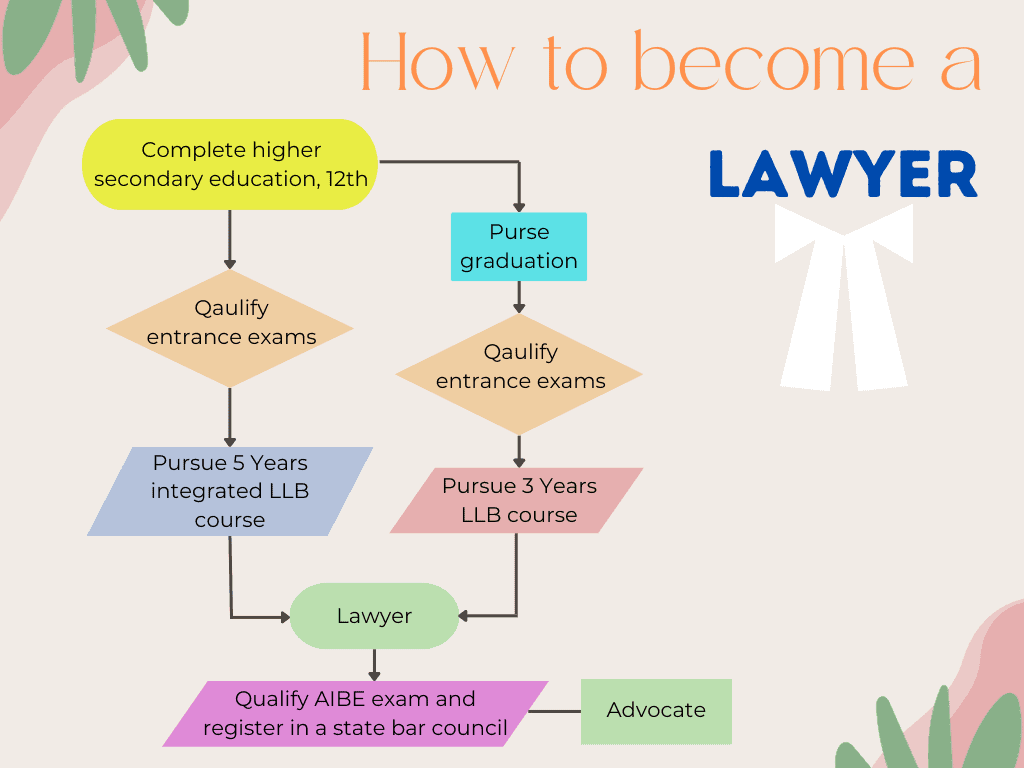The number of youth enrolling in law courses is increasing every year, the latest report from AISHE is 478012. Becoming a lawyer in India gives pride and authority to make a difference in society. Lawyers are prominent professionals in society and have very lucrative career opportunities with dynamic salaries.
If you are a law aspirant or you want to explore the various law courses after 12th then this article will help you.
In this article, we answer the question ‘How to become a Lawyer in India?’, with detailed information on entrance exams, law courses, colleges, fees and future scopes after graduating.
Who is a Lawyer?
A lawyer is a widely recognised title designated to someone who has completed a law degree. He is an authorised person who can practice law, and legal advice, represent clients in courts, and draft legal papers.
A brief about law degree
A law degree curriculum teaches about the Judicial System, Acts and various Laws such as constitutional law, criminal law, tort law, labour law, environmental law, Intellectual law, etc. Under these, you will learn about articles, the Indian Penal Code, and human rights. A law degree also provides moot courts for practice, which helps in understanding the rules of the court.
How to Become a Lawyer in India?
To become a lawyer in India an aspirant has to pursue a Law degree, and after completing the course consequently, the individual can become a lawyer.
We will see step by step process on
How to become a lawyer in India after 12th?
- Pass 12th standard, higher secondary education from a recognized board with a minimum of 45 % marks.
- Qualify for Law entrance exams such as CLAT, AILET, NLSAT etc
- Pursue 5 years of integrated Law courses such as BA LLB, BCom LLB, BBA LLB etc.
- Finally after completing an integrated Law degree, you will become a lawyer.
How to become a lawyer in India after graduation?
- Complete graduation or post-graduation with a minimum 50 % marks.
- Qualify for 3 years Law entrance exams such as CUET PG.
- Pursue 3 years LLB degree from recognized universities.
- Finally after completing a Law degree, you will become a lawyer.

Now we will see different types of law degrees in detail.
We have divided the law degrees into different categories
- Law courses after 12th
- Law courses after graduation
- Master’s degree in Law
- Doctorate degree in Law
Law courses after 12th
In India Law courses after 12th are Integrated law courses, with a duration of 5 years and the minimum eligibility is 12th pass with 45% marks in aggregate (40% in case of SC/ST). Students from arts commerce and science can pursue any of the courses mentioned below.
BA LLB: Bachelor of Arts and Bachelor of Laws is a 5-year integrated course, where you will study foundational law subjects along with arts subjects such as political science, sociology etc.
BBA LLB: Bachelor of Business Administration and Bachelor of Laws is a 5-year integrated course. It’s another popular course like BA LLB. The curriculum is designed to integrate foundation law subjects and management subjects such as organisational behaviour, Human resources etc.
BSC LLB: Bachelor of Science and Bachelor of Laws is 5 years integrated course. This course has foundational law subjects along with science subjects such as biotechnology, pharmaceutical, computer science/IT, data science etc.
BSW LLB: Bachelor of Social Work and Bachelor of Laws is 5 years integrated course designed for students who want to make a difference and bring change in society. The subjects you will study are human development, society and sustainable development, social work methods etc.
BCOM LLB: Like other courses above Bachelor of Commerce and Bachelor of Laws is a 5 year integrated course. The curriculum is designed to understand commerce subjects such as accounting, law business etc.
BLS LLB: Bachelor of Legal Science and Bachelor of Laws is a 5 years integrated course. The subjects here addition to foundation law subjects you will cover political science, economics, sociology etc. The course subjects seem similar to BA LLB but BLS LLB curriculum gives you more knowledge on the legal side.
Law courses after graduation
LLB: The full form of LLB is Legum Baccalaureus (Latin) or Bachelor of Laws. After completing your graduation you can pursue LLB. The LLB degree course has a duration of 3 years designed entirely to teach about the law.
The student who completes a 3-year degree is awarded an LLB degree and can practice law in court as an advocate. Few colleges do offer LLB (General) at the end of 2 years and will not be allowed to practice as an advocate in court.
Master’s degree in Law
LLM: Legum Magister (Latin) or Master of Laws is the full form of LLM. The minimum eligibility criteria are a 3-year or 5-year LLB course with a minimum of 50 % marks and 45% in the case of SC/ST students.
The duration of the course is 1 Year and the LLM degree curriculum offers various specializations.
Top Law University’s curriculum emphasizes more on core subjects and study specialization from electives. After completing the course students receive the LLM degree in the specific specialization(elected).
Specializations offered by various colleges are
- Business and Corporate Law
- Constitutional and Administrative Law
- Intellectual Property Law
- Criminal and Security Law
- Human Rights Law
- Law, Policy and Good Governance
- Family Law
- European Union Law and International Law
- Cyber Law
- Energy Law
Post Graduate Diploma(PGD): The postgraduate diploma course has a duration of 1 year with minimum eligibility criteria for graduation. You can pursue Postgraduate diploma courses with any one specific specialization (mentioned above in the LLM course).
Few colleges in India offers postgraduate diploma compared to LLM. Other field graduates can also pursue postgraduate diplomas.
Doctorate Degree in Law
PhD in Law: PhD in law is the final degree in Law an individual can achieve. This course is for individuals who are interested in research and contributing to the field of law.
The minimum eligibility criteria is LLM (Master of Laws), a course duration of a minimum of 3 years and a maximum of 6 years to complete the research work.

Law entrance exam
| LawEntrance Exam | Universities |
| CLAT | Common Law Admission Test is conducted to get admission to 25 NLUs. |
| AILET | All India Law Entrance Test examination is conducted for getting admission to NLU Delhi |
| NLSAT | National Law School Admissions Test is conducted for getting admission in a 3-year LLB at NLSIU Bengaluru |
| CUET | Common University Entrance Test is a national entrance test for admission in all central universities offering undergraduate Law degrees |
| CUET PG | Common University Entrance Test Post Graduate is a national entrance test for admission in all central universities offering post-graduate Law degrees (LLM) |
| SLAT | Symbiosis Law Admission Test is conducted for admission in Symbiosis Law schools |
| SAAT | Siksha ‘O’ Anusandhan Admission Test for getting admission in undergraduate Law degrees offered by SOA National Institute of Law |
| KIITEE | For admission to undergraduate Law course at Kalinga Institute of Industrial Technology |
| LPUNEST | For admission to undergraduate Law course at Lovely Professional University |
| PU BA/BCOM LLB and PU LLB entrance test | Admission to Panjab University for Undergraduate and postgraduate law degree. |
| MAH CET | Admission to 5-year integrated and 3-year LLB courses in Maharastra State Universities |
| AP LAWCET and AP PGLCET | Admission to 5-year integrated and 3-year LLB and LLM courses in Andhra Pradesh State Universities |
| TS LAWCET and TS PGLCET | Admission to 5-year integrated and 3-year LLB and LLM courses in Telangana State Universities |
Jobs and Future Scope after becoming a lawyer
Now you know how to become a lawyer in India, so let’s see the career options for a lawyer. We will answer another common question ‘How to become an advocate?’
Looking at the current market needs the lawyer has a bright future. We listed down some of the career opportunities for a law graduate.
Advocate: To become an advocate you have to clear the AIBE (All India Bar Exam) and register in a respective State Bar Council where you want to practice. You can join law firms, learn and assist with a decent salary.
There is another way to learn and grow by working under a senior lawyer, they might offer you a stipend. In Litigation, high experience leads to a good amount of salary. Here you might work on all types of cases from family disputes, criminal cases, taxation law, property disputes etc.
Public Prosecutor: The state government and Central government appoint a prosecutor to represent on behalf of them. After gaining good experience and earning a name you will get the opportunity to become a public prosecutor.
Corporate Lawyer: MNC offers a good salary to LLB graduates who have good subject knowledge. If you are pursuing your LLB degree from one of the top universities there is a chance of getting a good job offer as a legal counsel with a very good salary.
You will not be able to practice law in court, rather you will be drafting legal documents.
Civil and Judicial Services: You can try for the Judicial Services exam conducted by state governments and the Union Public Service Commission (UPSC) to recruit civil judges and magistrates.
It’s a very good opportunity where you will have the authority to make a decision and get a good amount of salary according to government grade pay.
Legal officer in RBI and Banks: You can join as a legal officer in public sector banks and RBI. IBPS specialist officer exam is conducted to recruit lawyers in banks whereas RBI conducts its own entrance recruitment exam. They offer very good salaries and stable jobs.
JAG entry scheme in Indian Army: The Indian Army recruits unmarried male and unmarried female Law graduates as a Lieutenant for the Judge Advocate General Branch.
PSU jobs: You have an opportunity to work in PSU as well, where top PSU consider the CLAT PG exam to recruit lawyers.
Professor: You can opt for higher studies LLM and PhD, or qualify UGC NET exam. You can start as an assistant professor at different law colleges.
Top law colleges in India
We tried to add the top 10 law colleges in India according to the NIRF ranking. We added law course fees which might help in making the decision.
| University/College | Course Fees |
| National Law School of India University, Bengaluru | BA LLB (5 years) and LLB (3 Years) fees – Rs. 3,75,500 per annum |
| National Law University, New Delhi | Rs 3,65,000per Annum |
| Nalsar University of Law, Hyderabad | Rs 2,97,000 per Annum |
| The West Bengal National University of Juridical Sciences, Kolkata | Rs 4,15,900 per Annum |
| Jamia Millia Islamia, New Delhi | Rs 40,500 per annum |
| Symbiosis Law School, Pune | BA LLB (5 years) fees – Rs. 4,00,000 per annum LLB (3 Years) fees – Rs 2,84,000 per annum |
| Gujarat National Law University | Rs 2,58,000 per annum |
| Siksha `O` Anusandhan | BA & BBA LLB (5 years) – Rs 2,46,000 per annumLLB (3 Years) – Rs 2,16,000 per annum |
| Indian Institute of Technology Kharagpur | Rs 1,11,500 per annum |
| Babasaheb Bhimrao Ambedkar University | Rs1,20,000 per annum |
Note: The fees listed above are subject to change, either they might increase or decrease.
Best private law colleges in India
Since you saw two of the top private colleges above, we will list on other private colleges.
- Symbiosis Law School
- Siksha `O` Anusandhan.
Now we will see another top 5 private law colleges in India.
| University/College | Course Fees |
| Saveetha Institute of Medical and Technical Sciences | BA LLB (5 years) – Rs. 2,75,500 per annum |
| Kalinga Institute of Industrial Technology | Rs 3,40,000 per Annum |
| Christ University | Rs 1,80,000 per annum for Karnataka Students Rs 2,05,000 per Annum for Non Karnataka students |
| Shanmugha Arts Science Technology & Research Academy | Rs 1,40,000 per Annum |
| Lovely Professional University | Rs 2,40,000 per annum |
Disclaimer: The fees listed above are subject to change, they might increase or decrease.
Conclusion
Lawyers are very professional, unbiased individuals, despite being very lucrative the profession needs dedication. We always recommend pursuing you law degree from a top University, the reason being the quality of study and placement opportunities you will get.
If the above article helps your question on how to become a lawyer in India then do share this article with your friends and family.
Also, check the career options in arts and commerce.




